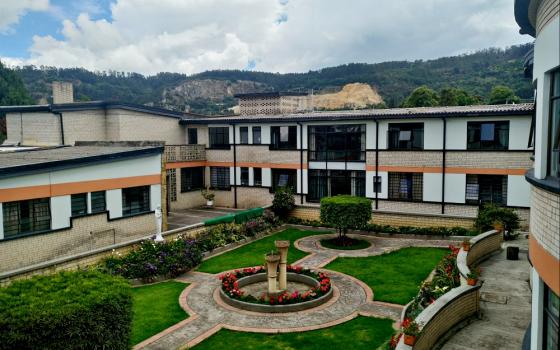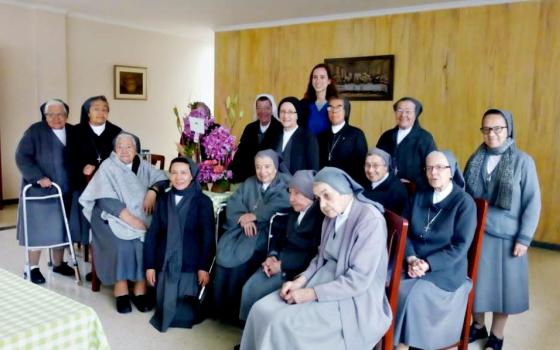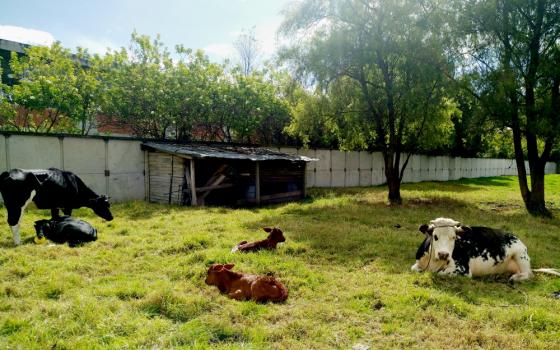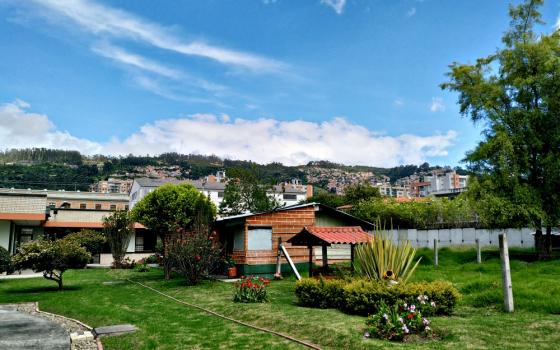Notes from the Field includes reports from young people volunteering in ministries of Catholic sisters. A partnership with Catholic Volunteer Network, the project began in the summer of 2015. This is our eighth round of bloggers: Sarabella Muise is a Good Shepherd Volunteer in New York City, and Julianna Lewis is a VIDES+USA volunteer in Bogotá, Colombia. This is Julianna's second blog post. Read more about her.
___
Beautiful gardens, expansive pastures, cows grazing, views of the surrounding mountains — when I arrived on the first day of September at my placement site in Colombia, it was hard to believe that I was actually within the city limits of Bogotá.
Casa Madre Mazzarello, where I would be spending my next few months, is nestled in the northeastern corner of this large capital city. It is a kind of retreat from the bustle of the urban life, something apparent when you first enter the walled-in property.
The house acts as a permanent care home for elderly Salesian sisters and as a place of rest and recovery for sisters who have undergone surgeries or medical procedures. When I arrived, there were 32 sisters, the majority of whom are permanent residents. The mission here is to continue to fortify the spiritual life of the sisters while managing their health.
As a VIDES+USA volunteer, I live in community with the sisters at their house. I share in meals, Mass, prayers and some community activities.
In addition to engaging in daily life with the sisters, I also have assignments I have to fulfill. My main tasks include organizing medications, assisting sisters in using the bathroom, taking vital signs, taking the nuns to doctors' appointments, making the sisters' beds, transporting those in wheelchairs, and accompanying the sisters by spending time with them. In other words, "presence."
My first few days living in the religious house were a shock for me. Having just graduated from university, where my schedule was incredibly fluid, it was difficult, at least at first, to follow a very structured schedule.
My daily routine at Casa Madre Mazzarello looks something like this: My day starts at 7 a.m., when I attend the shift change between the night nurses and the day nurses. I listen to the health status of each of the sisters and what needs to get done for each during the day.
After this, I usually help wake up some of the elderly sisters and the nurse gets them each in the shower while I make their beds and arrange their habits they will wear that day.
At 7:30 sharp, I transport the sisters in wheelchairs from the chapel to the dining hall. We eat at precisely 7:40; at 8:30, I return to work, preparing all of the sisters' daily medications.
Afterward, I usually take the sisters who are in wheelchairs or use canes on strolls through the gardens. At noon, we all gather in the dining hall for lunch, the most important and largest meal of the day in Colombian culture.
From 1 to 2 in the afternoon, the sisters have "recreation," which is a tradition begun by St. Mary Mazzarello, the congregation's foundress. During recreation, the sisters play board games, watch television, or simply sit and socialize. Once this ends, I help transport some of the sisters to the chapel for prayer. In the afternoon, I aid in taking vital signs, visit each of the sisters in their rooms to spend time with them, and help any sisters who need to use the bathroom or need any other type of assistance.
By 4 p.m., I deliver dinner to the rooms of the sisters who go to bed early. After they eat, I help the nurses prepare those sisters for sleep by changing them into their pajamas, closing their windows and curtains, and getting them into their bed and under their covers. The rest of the community eats dinner at 5 p.m. and then I have the rest of the evening free.
Besides this defined, rigid schedule, another adjustment for me is the cool, sometimes cold, weather. Bogotá is located on a high plateau, skirted by several mountains. The altitude and location in the country make it such that there are no seasons in Bogotá and the weather always ranges between about 40-60 degrees Fahrenheit. Being a native of southern Texas, this is quite the rough adjustment!
Yet, although these changes have been difficult to become accustomed to, there is a beauty in stepping into the shoes of these sisters and sharing in their daily lives.
Spending so much time with them, I have come to truly see how the sisters embody Salesian spirituality — the spirituality of St. Francis de Sales. One of the aspects of this spirituality is acknowledging God in even common daily tasks. This is most evident to me in the morning, when the sisters begin their days in prayer and Mass, pray before and after each meal, and have communal prayer once in the afternoon and once in the evening.
I am more aware than I ever was about small things — such as taking a walk in the gardens, getting into the car for a drive, washing a dish or organizing something in the sisters' rooms. These serve as new opportunities for prayer and giving thanks to God. It is inspiring to see how the sisters perceive God in almost anything and turn this recognition of his presence into immense gratitude.
I have learned that a fruitful prayer does not necessarily only stem from a formal "sit-down" in the chapel. The majority of a day is spent outside of the chapel, due to daily responsibilities and the work that God is calling us to do. I now see that the Salesian approach to prayer and devotion is incredibly practical — turning the day into a prayer in and of itself.
While taking one of the sisters for a stroll with her walker, she immediately gave thanks to God for the opportunity to walk and pleaded that every step she take be out of love for God.
This exhortation by the sister mirrors the famed expression that Mazzarello would share with her young textile pupils: "Every stitch must be an act of love for God."
Mazzarello trained young girls coming from families of low socioeconomic status in the art of textiles. She gave these girls a skill and through this work taught them about faith and how to live out their lives and cherish monotonous and ordinary tasks, recognizing them as acts of love and gratitude.
Well over a century later, the sisters and I are still learning from St. Mary Mazzarello's teachings. In this cool and mountainous capital city in the Andes, I find myself seeing the love of God in simple things. Life is so much sweeter now with this joyous daily recognition!
[Julianna Lewis is a VIDES+USA volunteer working with Salesian sisters in Bogotá, Colombia.]




